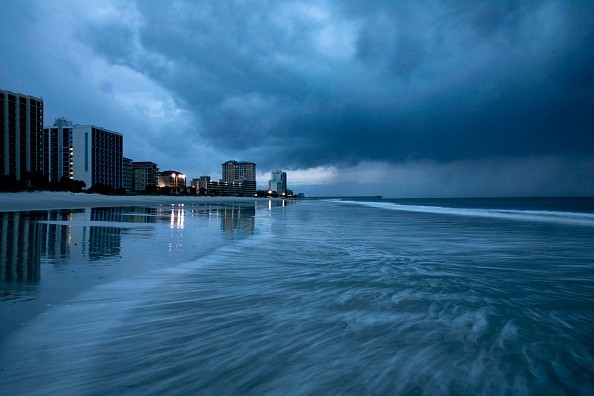As the global climate crisis intensifies, a new study has shed light on the potential economic devastation that the European Union and the United Kingdom might face due to rising sea levels.

Rain begins to fall as the outer bands of Hurricane Florence make landfall in Myrtle Beach, South Carolina on September 13, 2018.
Urgent Need for Proactive Measures
Conducted under a high-emissions scenario, Interesting Engineering reported that the study paints a bleak picture, estimating colossal economic losses of up to 872 billion euros by the end of the century.
The analysis considered data from 271 European regions, factoring in the absence of new coastal protection measures implemented post-2015. This prediction underscores the urgent need for proactive measures to mitigate the impacts of climate change on coastal economies.
The researchers employed a comprehensive approach by combining an existing economic model with data encompassing projected impacts of sea-level rise, investment patterns, and the economic losses incurred during 155 flooding events across Europe from 1995 to 2016.
This integration allowed for a nuanced understanding of potential economic outcomes in contrast to a hypothetical scenario with no sea-level rise.
Upon meticulous examination, the results indicated not only potential economic losses but also gains, painting a dynamic picture of the economic landscape under varying sea-level rise scenarios.
The scenario assuming constant sea levels across all regions projected a consistent two percent growth. Moreover, the experts went beyond predictions by introducing a model that illustrated the potential effects of targeted investments in different economic sectors.
This model provided insights into how regional economies could be influenced by strategic interventions following sea-level rises, offering a more detailed perspective on adaptation strategies and economic resilience in the face of climate change impacts.
Economic Losses Across UK, EU
The researchers anticipated that, in a high-emissions scenario, the impact of rising sea levels could result in a cumulative economic loss of 872 billion Euros across the United Kingdom and European Union by the year 2100. This projection contrasts with a hypothetical scenario where no sea-level rises are observed.
The study highlighted notable regional disparities in economic repercussions arising from sea-level rises, emphasizing significant financial losses of up to 21 percent of regional gross domestic product (GDP) by 2100.
EurekAlert reported that coastal areas such as Veneto and Emilia-Romagna in Italy and Zachodniopomorskie in Poland bore the brunt of these losses.
The statement pointed out that other regions experiencing comparatively higher economic losses were concentrated around the Baltic Sea, the Belgian coast, western France, and Greece.
Also Read : Greenland's Lesser-Known Glaciers Surge in Melting Rates, Revealing Alarming Impact on Sea Levels
The researchers attributed this trend to the relocation of production from flooded coastal regions to inland regions.
The study also revealed that targeted investment in sectors like logistics, public services, construction, and utilities had minimal impacts on the overall UK and EU economy under a high emissions scenario. However, it did succeed in mitigating some regional losses with negligible costs to the broader economy.
Published in the journal Scientific Reports, these findings underscore the necessity for tailored economic policies at the regional level to address the uneven impact of sea-level rises on different areas and their respective economies.
Related Article : Rising Sea Levels Will Result in More Occurrence of '100-Year Flood' Events Annually, New Study Reveals

ⓒ 2026 TECHTIMES.com All rights reserved. Do not reproduce without permission.




